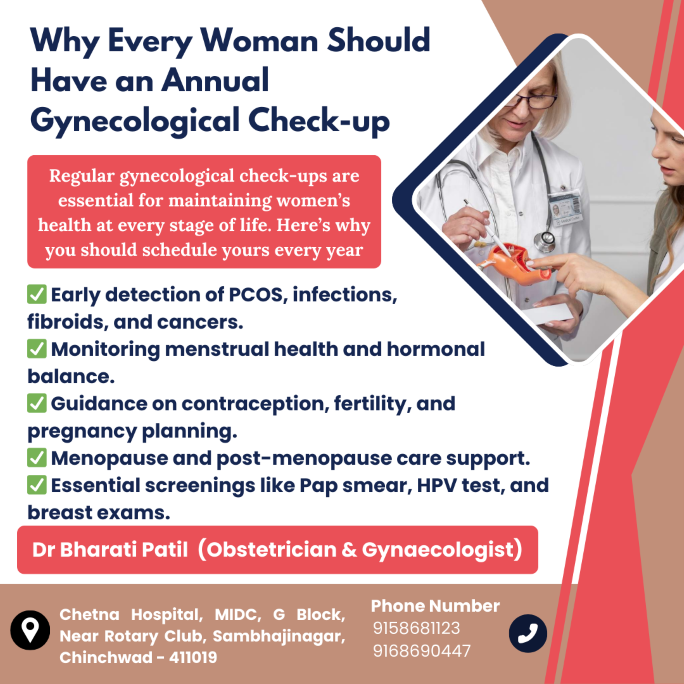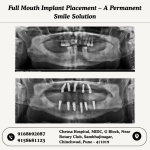Women’s health is a critical aspect of overall well-being, and regular gynecological check-ups play a significant role in ensuring a healthy life. Many women tend to ignore or delay their visits to the gynecologist unless they experience severe health issues. However, annual gynecological check-ups are essential for preventive care, early detection of potential health concerns, and maintaining reproductive and overall health. In this blog, we will explore the importance of annual gynecological exams, what they include, and why every woman should prioritize them.
1. Early Detection of Health Issues
One of the most important reasons for an annual gynecological visit is early detection of potential health issues. Conditions such as cervical cancer, breast cancer, ovarian cysts, fibroids, and sexually transmitted infections (STIs) can be asymptomatic in the early stages. Routine screenings help detect these conditions early, increasing the chances of effective treatment and recovery.
For example, a Pap smear test helps in detecting abnormal cervical cells that may develop into cancer if left untreated. Similarly, breast examinations and mammograms (for older women) can identify lumps or abnormalities that may indicate breast cancer. Regular monitoring ensures timely intervention, which can be life-saving.
2. Maintaining Reproductive Health
For women in their reproductive years, annual check-ups are crucial in ensuring a healthy reproductive system. Women planning pregnancy or those experiencing menstrual irregularities can benefit greatly from a gynecological evaluation. Some key aspects include:
- Monitoring Menstrual Health: Irregular periods, heavy bleeding, severe cramps, or missing periods can indicate underlying health problems such as polycystic ovary syndrome (PCOS) or endometriosis.
- Fertility Concerns: If you are trying to conceive, a gynecologist can assess fertility-related issues and provide guidance on conception strategies.
- Contraceptive Counseling: Whether you are looking to start, change, or discontinue birth control methods, your gynecologist can recommend the best options based on your health and lifestyle.
3. Screening for Sexually Transmitted Infections (STIs)
Sexually transmitted infections (STIs) can have severe long-term consequences if left untreated, including infertility and chronic pain. Many STIs are asymptomatic, making regular screenings essential, especially for sexually active women. A gynecologist can perform tests for chlamydia, gonorrhea, HIV, syphilis, and HPV, among others, ensuring early treatment and reducing complications.
4. Managing Hormonal Imbalances
Hormonal imbalances can affect a woman’s health in multiple ways, leading to issues such as acne, hair loss, weight gain, mood swings, and irregular periods. Conditions like PCOS, thyroid disorders, and menopause significantly impact hormonal health. During an annual visit, your gynecologist can assess symptoms, recommend hormone level tests, and suggest appropriate treatments, such as medications, lifestyle changes, or hormone replacement therapy (HRT) for menopausal women.
5. Menopause and Post-Menopause Care
Menopause is a natural transition in a woman’s life but can bring along challenges such as hot flashes, osteoporosis, vaginal dryness, and mood changes. Regular gynecological check-ups help in managing menopause-related symptoms effectively. Your doctor may suggest calcium supplements, dietary modifications, and hormone therapy to maintain bone health and overall well-being.
6. Preventive Vaccinations
Preventive healthcare is just as important as treatment. Gynecologists recommend vaccinations that can protect against severe health conditions, such as:
- HPV Vaccine: Prevents cervical cancer and other HPV-related diseases.
- Hepatitis B Vaccine: Protects against liver infections.
- Flu and COVID-19 Vaccines: To boost immunity and prevent seasonal illnesses.
Vaccination recommendations vary by age, medical history, and lifestyle, so it is best to consult your gynecologist for personalized guidance.
7. Mental Health and Well-being
Women’s health is not just about physical well-being but also emotional and mental health. Many women experience stress, anxiety, postpartum depression, and other psychological challenges related to reproductive health. Gynecologists often provide emotional support and can refer patients to mental health professionals if needed. Open discussions about sexual health, body image, and emotional well-being during check-ups can be extremely beneficial.
8. Lifestyle and Nutritional Guidance
Good nutrition and an active lifestyle are essential for maintaining reproductive health. During your annual visit, your doctor can provide tailored advice on dietary habits, exercise routines, and lifestyle changes to improve overall well-being. For instance, a woman suffering from PCOS may benefit from a low-carb diet and regular workouts, while a menopausal woman may need more calcium and vitamin D to prevent osteoporosis.
9. Pelvic Floor Health
The pelvic floor muscles play a crucial role in supporting reproductive organs, bladder control, and sexual function. Many women, especially after childbirth or with aging, experience pelvic floor disorders such as urinary incontinence and pelvic organ prolapse. A gynecologist can evaluate pelvic health and suggest Kegel exercises, physiotherapy, or surgical options if necessary.
10. Addressing Sexual Health Concerns
Many women hesitate to discuss sexual health issues, but a gynecologist’s office is a safe space for such conversations. Whether it is pain during intercourse, low libido, vaginal dryness, or infections, a gynecologist can provide appropriate treatments and guidance to improve sexual well-being.
What to Expect During an Annual Gynecological Check-up?
A routine gynecological exam typically includes the following:
- Medical History Discussion: Your doctor will ask about menstrual cycles, sexual activity, contraceptive use, family history, and any concerns.
- Physical Examination: Includes weight check, blood pressure measurement, and breast examination.
- Pelvic Examination: Assesses vaginal and reproductive organ health.
- Pap Smear Test: Screens for cervical cancer.
- Breast Examination: Checks for lumps or abnormalities.
- STD Testing: If recommended based on medical history and lifestyle.
- Counseling & Recommendations: Your doctor will provide advice on contraception, lifestyle modifications, and any necessary treatments.
For Consultation Contact us on 9168690447 / 9158681123
Website –
www.chetnahospital.co.in
Address – Chetna Hospital, Sambhajinagar, MIDC, G Block, Near Rotary Club, Chinchwad 411019
.
.
.
#hospital#pune#pcmc#chinchwad#health#healthcare#gynaecologist#femalegynaecologist#gynaecologistappointment#gynac#gynaecologistdoctor#gynaecologisthospital#goodgynaecologist#gynaecologistspecialist.













